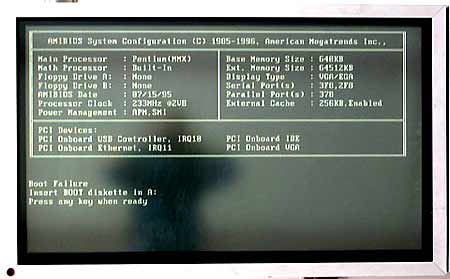… this is ridiculous.

Regular readers will know that I always photograph this display at Cambridge station when it’s showing a blue screen of death. But this morning there wasn’t even a screen, blue or otherwise. What can it mean?

… this is ridiculous.

Regular readers will know that I always photograph this display at Cambridge station when it’s showing a blue screen of death. But this morning there wasn’t even a screen, blue or otherwise. What can it mean?
Well, well. From BBC online…
Microsoft’s next version of its browser, Internet Explorer 7, will make it easier for people to keep automatically aware of website updates.
IE7 will have an orange button on the toolbar which will light up when it detects a Really Simple Syndication (RSS) feed on a site.
Users can click on a “plus” button to subscribe to the site’s feed, as they would with a bookmark.
What’s funny about this? Nothing. It’s just that I’m using Safari (the browser that comes with Mac OS X) and it has exactly this feature built in. Now.
 .
.
Still, full marks for effort to Redmond.
From a Register story:
Microsoft has bowed to Beijing’s political censors and has banned the use of the words “freedom” and “democracy” on some areas of its Chinese internet portal, along with a host of other politically sensitive words such as “Taiwan independence” and “demonstration”.
According to the Financial Times, portal operators have imposed the restriction on the names users give their blogs, although the words can still be used within blog’s text. Users who try to use the offensive terminology are met with error messages informing them that they have used “forbidden speech”, which they are asked to delete from the item.
Microsoft’s statement on ‘Corporate Citizenship’ says:
Microsoft is committed to being a responsible industry partner. We work with businesses, communities, and governments to help advance social and economic well–being, and to enable people around the world to realize their full potential.
Er, except, it seems, in China.
Ed Felten has some interesting reflections on the threat of cyberattack on the US information infrastructure. He puts his finger on the nub of the problem:
the traditional governmental processes are ill-suited for addressing cyberthreats. The main reason is that national security processes result in plans for governmental action; but the cyberthreat problem can be solved only by private action. The cyber infrastructure is in private hands, and is designed to serve private ends. Government can’t easily change it.
So what can be done? One idea he discusses is that since unprotected computers in private hands make the entire infrastructure vulnerable, then perhaps individual computer users ought to be personally liable for damage caused by their carelessness/ignorance. Ed points out that there are lots of things wrong with this idea. But, oddly, he doesn’t discuss another obvious possibility — that software manufacturers like Microsoft should be legally liable for damage caused by the security holes in their products. I’ve never understood why the computer industry should be able to avoid liability in this way. Just imagine the fuss there would be if automobile manufacturers were able to avoid being held responsible for flaws in their products. It’s unthinkable. But we tolerate this crazy situation with computers. Why?
Interesting piece in the NYT.
From the 1986 to 1996, Microsoft’s stock soared more than a hundredfold as the company’s Windows operating system and Office applications dominated the PC industry. That explosive climb made millionaires of employees who had accepted options as a substantial part of their compensation for 60-hour workweeks fueled by a diet of Twinkies, Coca-Cola and marshmallow Peeps. The sudden riches led many to refer to themselves as “lottery winners.”
“While the exact number is not known, it is reasonable to assume that there were approximately 10,000 Microsoft millionaires created by the year 2000,” said Richard S. Conway Jr., a Seattle economist whom Microsoft hired to study its impact on Washington State. “The wealth that has come to this area is staggering.”
Even allowing for this particular consultant’s contractual obligations, it’s true that Microsoft has enriched many employees who have gone on to fund worthwhile projects. One of them, a friend of mine, gave over £1 million to UK charities before he died.
A typical, old-media, news-free, adulatory piece about Microsoft — in this case a profile by Steve Lohr of Eric Rudder, who is supposedly a “rising star” in Redmond. Here’s the opener:
The path to the top at Microsoft is not for the timid. Anyone hoping to make the ascent must be able to match wits with two of the most formidable and combative intellects in corporate America: Bill Gates, Microsoft’s co-founder, and Steven A. Ballmer, its chief executive.
Eric Rudder, a senior vice president, demonstrated that skill not long after he arrived at Microsoft. In 1992, Mr. Rudder, then 25, had a confrontation with Mr. Gates, recalled Brad Silverberg, a former senior Microsoft executive. The dispute centered on some now-forgotten technical matter in the Windows desktop operating system.
“Bill, you’re absolutely, totally wrong,” Mr. Rudder said, according to Mr. Silverberg. “And here’s why.”
After hearing him out, Mr. Silverberg said, Mr. Gates conceded the point, saying: “You know what? I guess you’re right.”
See what I mean? This is lazy, uncritical journalism. Pass the sickbag, Alice.
Passing through Cambridge station the other day, Alan Jackson of AidWorld noticed an interesting malfunction.

Normally, it’s the central monitor that is displaying the Blue Screen of Death. This time it was the left-hand screen, displaying a prompt well known to those aged 50 and over! Ah, the days of booting from floppies… Don’t think my kids have ever used one.

Here’s a neat little sca…, er scheme. The UK government, in its laudable attempt to raise school standards, has a ‘specialist school’ programme. The aim is to encourage schools to aspire to excellence in a particular field, and to reward such aspirations and efforts. All very right and proper, not to say admirable. As I understand it, if a school gets specialist status, then the government offers it additional funding (~£100k) provided the school can match that by raising £50k itself from companies and sponsors.
So far, so good. Schools in affluent areas can generally raise the necessary £50k, but their counterparts in poorer areas have great difficulty in raising the dosh.
Enter, stage right, a friendly US monopolist which offers to provide the sponsorship needed to tip the school over the threshold.
Hooray! Microsoft is generously donating £50k to every needy, aspirational school! What a turn-up for the books!
Er, no. In the words of the hapless Specialist Schools Trust,
Microsoft has offered to support a further 65 aspiring specialist schools. Support is for schools applying in the October 2005 bidding round only and will be in the form of a software licence entitling schools to Microsoft software titles, upgrades and support over the initial four-year development period.
Neat, isn’t it. The cost to Microsoft is precisely zilch. But the result is 65 more hapless schools being locked into a software and hardware ecology that none of them can sustain or support. It’s a bit like a re-run of those Imperialist narratives where African tribesmen sign away their natural resources for a handful of baubles. And what’s funny is that the Specialist Schools Trust professes itself “delighted” by the wheeze. That’s probably because the Trust’s worthies know as little about software as the aforementioned tribesmen knew about Uranium 235.
Microsoft understands the value of W.C. Fields’s famous adage: never give a sucker an even break.
Today’s Observer column on the benefits to UK schools of weaning themselves off Microsoft software.
The BECTA report is out. Its findings are what one would expect: significant savings and improved performance from dropping Microsoft. At last, the penny begins to drop. Yippee!